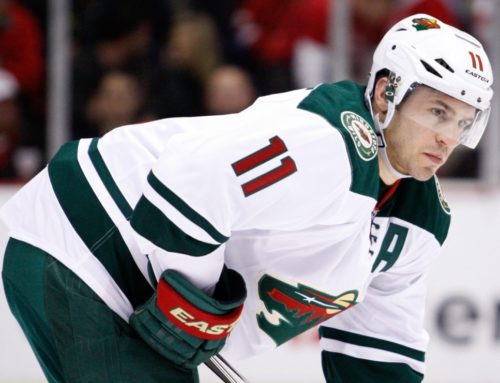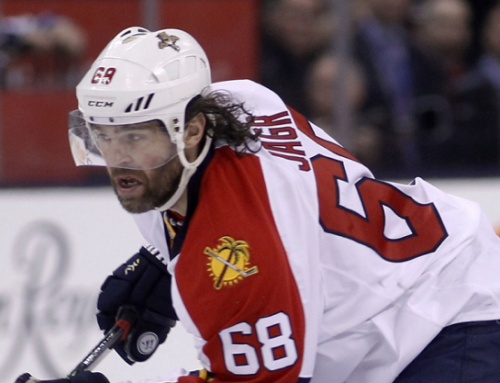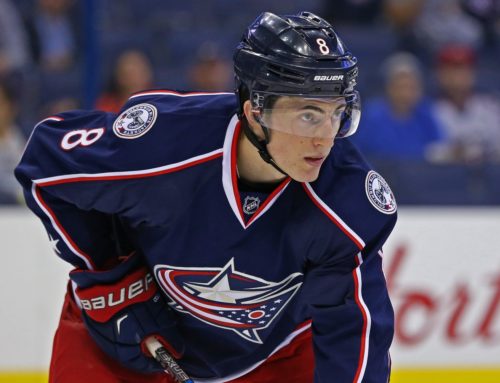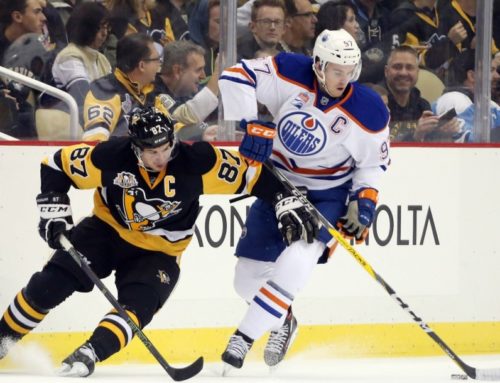The Contrarian: Short Summer
Demetri Fragopoulos
2016-09-18

The World Cup of Hockey could have a negative impact on many participants' NHL seasons.
I have read a few articles that follow a premise similar to this piece from the Washington Post titled “World Cup of Hockey gives nine Capitals a jumpstart to season”.
Like the title suggests, we are to believe that the players involved in the World Cup of Hockey will be better prepared for the new NHL season. The author Isabelle Khurshudyan writes “Though the competition could cause them to miss the start of Washington’s training camp, the World Cup has forced them to intensify their training for the season sooner, likely a good thing by the time the NHL regular season starts.”
For the nine Caps in the World Cup, the start of the season has been jump-started https://t.co/R9R00Ob8lV
— Isabelle Khurshudyan (@ikhurshudyan) September 12, 2016
A discussion with Patrick Kane in this Chicago Tribune column has him stating, “Everyone pretty much will be in midseason form once they're done with this tournament. It's such a high level of hockey. Playing against this competition is going to be good for all and I think (it's) only going to help elevate our game."
Goodbye NHL offseason, hello World Cup of Hockey https://t.co/cdnpuWpVgD by @ChrisKuc pic.twitter.com/EZBfNDqf2K
— ChicagoSports (@ChicagoSports) September 16, 2016
Is it true, will these players have an edge in the regular season over others which are not participating in this pre-season tournament?
People tell us that after a long and gruelling Stanley Cup playoff run the teams that go far have a hard time repeating their performances the following year.
This Wikipedia page gives us a summary of 2011, the year after the Boston Bruins won the Cup by saying “The Bruins' short summer took its toll early, going 3–7–0 in the month of October, before responding with a 21–3–1 record to cap off 2011, highlighted by a near-perfect November in which the team did not lose in regulation,” and, “They faced the Washington Capitals in the first round of the 2012 Stanley Cup playoffs. In a seven-game series which all of the games were decided by only one goal, the Bruins came up short against rookie goalie Braden Holtby and head coach Dale Hunter's defensive-minded game plan. The seventh game saw Joel Ward deflect the series-winning goal past Tim Thomas in overtime to give the Capitals the victory and end the Bruins' season.”
Kirk Vance of The Hockey Writers indicates that a “short season” is one of five reasons why teams do not repeat as champions. “After an 82 game regular season and four rounds of playoffs, the shortened summer, full of championship celebrations, can be devastating. The reduced break limits the amount of rest, recovery, and training players can fit in as they prepare for the upcoming season. All playoff teams suffer from this to varying degrees, but the Stanley Cup Champions play the farthest into the summer.”
This article from the Los Angeles Times has Rob Blake bring up a similar point. “Difficult because you become a target. Difficult because of the short summer”.
The story is reiterated by Marian Hossa. "You have such a short summer to prepare for the next season. Other teams are well-rested. Lots of teams had a long summer to prepare for a new season. They have jump and enthusiasm,” from the Chicago Tribune.
Hossa continues by adding: “We've got a target on our backs. Every game is extremely hard. We play 82 games basically like Game 7s because everybody tries to measure off of you as a top team. You don't get any breaks. It's not easy to play 82 games and then the playoffs and the high pace of the non-stop playoffs.”
So which is it? Will the players in the World Cup of Hockey perform better because they got warmed up or will they become worn down by the end of the season?
Let us run the numbers, but first we have to find them.
The last time there was a World Cup was 2004, but it was followed by the NHL lockout, so we cannot count on stats from that particular time. The one before that was in 1996.
I hate doing it because it took place 20 years ago, and the NHL had a different style to it back then, but it is what we have available to us.
Of the top 30 players from 1996-97, only ten had performed better than the previous year. Of those ten only six had improved by ten or more points.
If you take the point production differences of those top 30 players, their aggregate is minus-475 points. These are the best of the best, and they were worse off in the season that followed the World Cup.
Mario Lemieux, who earned 161 points the season before, tallied 122 points in 1996-97, and he did not even play in the World Cup. His drop of 39 points was not even the worse slippage from the players in the top 30 scorers. That distinction belonged to Jaromir Jagr, whose production fell by 54 points.
On the whole, using the more than 700 players that played at least one game in the 1996-97 season, there was a reduction of 492 goals and 1371 points.
If that is not enough to worry you, then let us look at the 120 NHL players that actually participated in the 1996 World Cup. Their production fell by 703 points.
While there were some players that improved like Robert Reichel (+62), Janne Niinimaa (+44), Pavel Bure (+42), Sergei Berezin (+41) and Alexei Yashin (+36), these increases were mostly due to the fact that these players were either new to the NHL or injured to some extent the year before.
The counter to those stats belonged to Pat LaFontaine (-83), Jaromir Jagr (-54), Joe Sakic (-46), Sergei Fedorov (-44), Claude Lemieux (-43), Mathieu Schneider (-42), Trevor Linden (-40) and Paul Coffey (-40).
All in all, 72 of those 120 NHL participants had worse seasons following the 1996 World Cup.
Want another way of looking at it? Let us compare the 1996 playoffs to the ones in 1997.
|
|
1996 |
1997 |
||
|
GP |
Teams |
GP |
Teams |
|
|
Cup Finalists |
22 22 |
Colorado Florida |
20 19 |
Detroit Philadelphia |
|
Conference Finalists |
18 19 |
Pittsburgh Detroit |
15 17 |
NY Rangers Colorado |
|
Second Round Teams |
12 11 13 10 |
Philadelphia NY Rangers St. Louis Chicago |
10 12 12 11 |
New Jersey Buffalo Edmonton Anaheim
📢 advertisement:
|
|
First Round Teams |
6 6 6 5 6 6 4 6 |
Tampa Bay Washington Montreal Boston Winnipeg Vancouver Calgary Toronto |
5 7 5 5 6 7 6 7 |
Montreal Ottawa Pittsburgh Florida Chicago Dallas St. Louis Phoenix |
|
Totals |
172 |
|
164 |
|
1996 teams in bold made the 1997 playoffs
1997 teams in bold made the 1996 playoffs
While nine teams repeated their inclusion into the post-season and four of those teams made the conference finals in 1997, the other five were done after the first round. The number of games played in the final two rounds clearly shows that the players on those teams were exhausted.
I think it is a good bet that the same thing is going to happen again this season. Pundits will talk about goalie equipment, size of the rinks and nets as the culprit for a lack of scoring, but they should consider that these players are not machines.
They need to rest. They do not need to have their summers cut short.
PS – There are 169 NHL players taking part in this year’s World Cup of Hockey. Here is a breakdown by NHL team:
|
Number of Players |
Teams |
|
12 |
Tampa Bay |
|
10 |
Chicago |
|
9 |
Washington |
|
8 |
Toronto |
|
7 |
Anaheim, Detroit, Philadelphia, San Jose, St. Louis, Winnipeg |
|
6 |
Boston, Colorado, Columbus, Minnesota, Montreal, Pittsburgh, Vancouver |
|
5 |
Los Angeles, NY Rangers |
|
4 |
Arizona, Buffalo, Calgary, Edmonton, Florida, Nashville, NY Islanders |
|
3 |
Dallas |
|
2 |
Carolina, New Jersey |
|
1 |
Ottawa |
Teams in bold made the 2016 playoffs
One Comment
Leave A Comment
You must be logged in to post a comment.





 COL
COL WPG
WPG NSH
NSH VAN
VAN WSH
WSH NYR
NYR L.A
L.A EDM
EDM TOR
TOR CAR
CAR FLA
FLA DAL
DAL VGK
VGK T.B
T.B PIT
PIT SEA
SEA OTT
OTT

i guess my Sens r going all the way then!!!